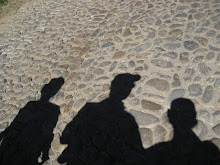"Darwin had already called into question the notion that humanity was fundamentally superior to the rest of the animal kingdom" (855). Clearly, Freud did not agree with this concept because he believed that human beings were one of the four great apes (humans, gorillas, chimps, orangutans) and therefore humans on their most basic level were animals. Freud's psychoanalysis was rather unsettling because it dealt with our two drives (aggressive and sexual) and how these two drives are always conflicting with our rational and moral conscience. Basically, only 10% of our brain is dealing with conscious thoughts (i.e. our free will) and the other 90% is all unconscious thoughts (most likely violent and sexual). Another key idea that Freud talked about was his model of the psyche "which contained three elements (1) the id, or undisciplined desires for pleasure, sexual gratification, aggression, and so on (2) the superego, or conscience, which registers the prohibitions of morality and culture; and (3) the ego, the arena in which the conflict between id and superego works itself out" (855). Freud stressed the "irrational," which just fed this growing tension and stress about human reason and what exactly defines reason, truth, science, etc...
A quote from Freud's Civilization and Its Discontents "in consequence of this primary mutual hostility of human beings, civilized society is perpetually threatened with disintegration," reminded me Nietzsche's concept of Nihilism because Nihilism dealt with human's innate drive to self-destruction. However, Nihilism talked more about how humans need to believe that life has meaning and to do this they must create new values (such as artists) instead of believing in truth, science, reason, or religion. Whereas, Freud is talking about how due to the strength of man's aggressive and sexual drives he will at some point not be able to control his drives and therefore end up killing or raping someone.
Overall, both Freud, Nietzsche, and all the rebellious artists provoked the minds of lots of lower, middle, and upper class people; however, "millions undoubtedly went about the business of life untroubled by the implications of evolutionary theory, content to believe as they had believed before" (857). So therefore these questions of human reason and primal urges made people wonder what the heck was going on, but they were still not as preoccupied with these questions as with the socialist question!!

"A quote from Freud's Civilization and Its Discontents "in consequence of this primary mutual hostility of human beings, civilized society is perpetually threatened with disintegration," reminded me Nietzsche's concept of Nihilism because Nihilism dealt with human's innate drive to self-destruction. However, Nihilism talked more about how humans need to believe that life has meaning and to do this they must create new values (such as artists)"
ReplyDeleteThat is a great point. Would you also consider, just to push the identification along, that for Freud, the Id's ability to attach itself to an idea is something the Ego has to deal with. Thus, nihilism--is the detachment of Id energy from meaningful creative ideas and attaching it to meanings that revolve around destruction--or as Freud would articulate it in the later stages--Eros departs and Thanatos is left...